third day of the third media forum KIEV MEDIA WEEK, despite the overcast weather was hot from morning to evening in the stands Ukrainian Content Market media people were discussing the nuances of future transactions, well, in the conference room in the meantime a panel discussion replaced another – in the best traditions of the meeting “Television as Business».
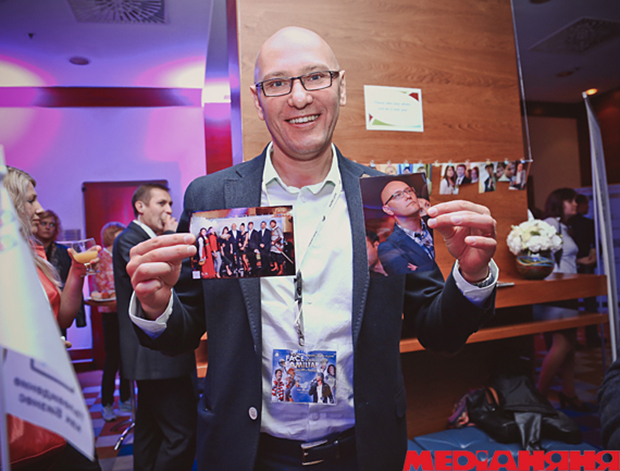
Before working at the conference guests had the opportunity to see photos of last year and found among them a
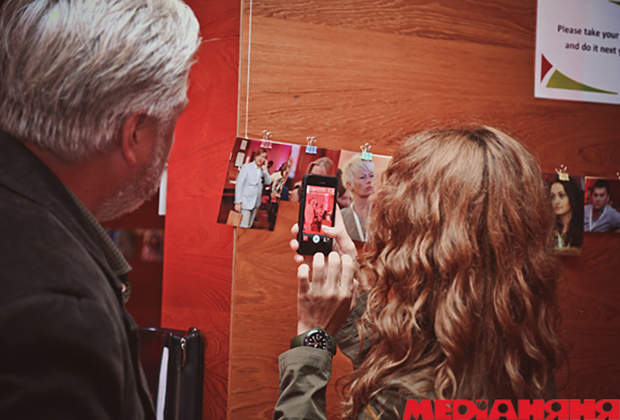
Iryna Kostyuk (TET) and Valentin Koval (M1, M2) process carried away,
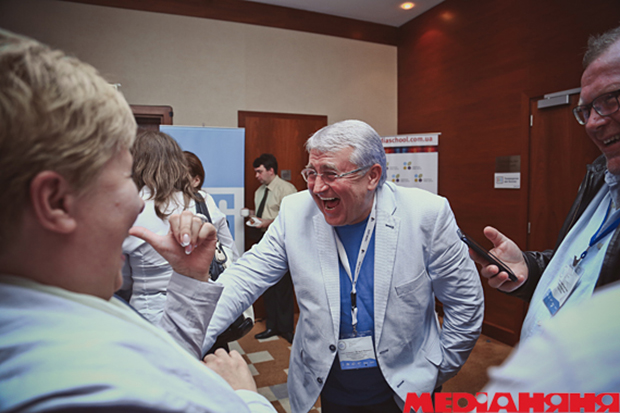
and those who were not at the conference last year, could only communicate with each other
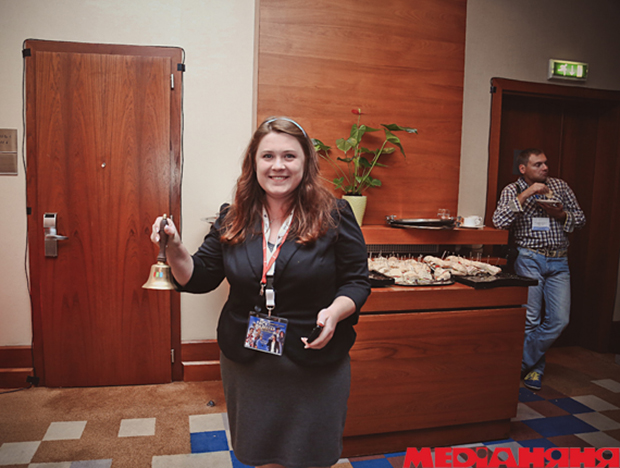
invited those present in the hall on a call – in the best traditions of theater
For seeds in ICT research shared fresh audience, telling someone to actually work Ukrainian channels, as representatives of “UMH” discovered the secret of how to make a multi-media business. But the most interesting media people has caused debate “Summit medialiderov»,
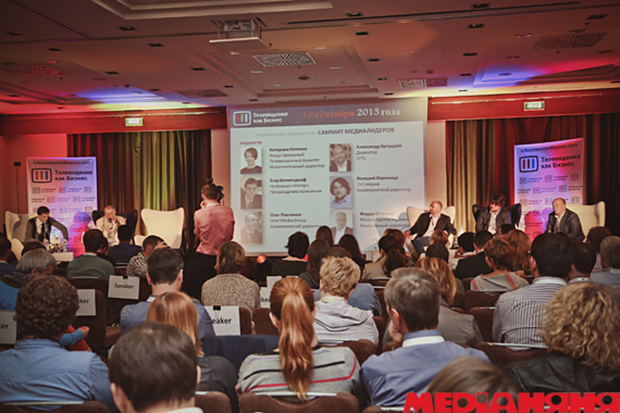
in which the panel came out
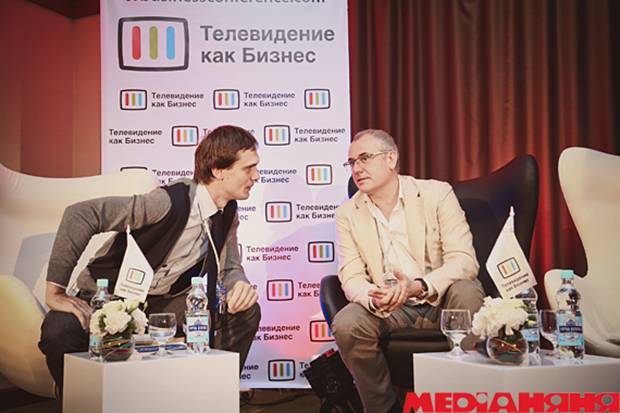
chairman of the “Inter” Yegor Benkendorf, commercial director of Inter Media Group Oleg Pavlenko,
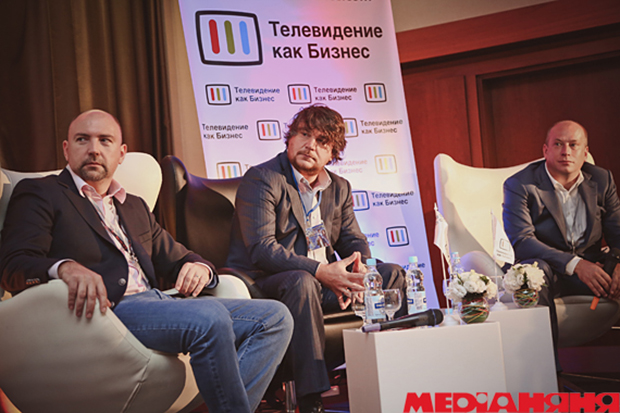
Executive Officer of ICTV Alexander Bohutsky, Commercial Director of “1 +1 Media” Valery Varenitsa and CEO “Media Group Ukraine” Fedor Ogarkov.
talked about the same thing – the value of content and advertising market, the ratio of which can not be considered the owners of TV channels business.
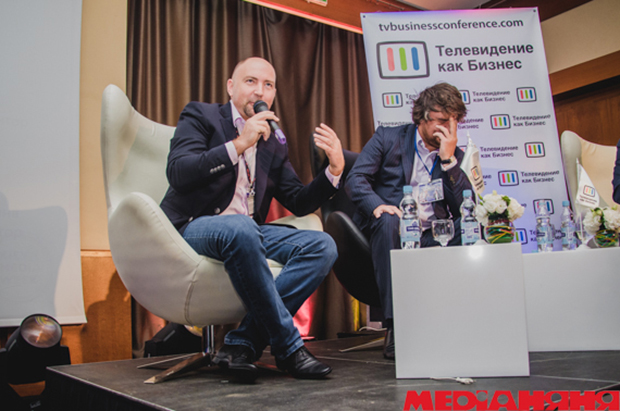
Top managers and then let go of the jokes in e-channels of competitors (especially got pluses that with the filing of Bohutsky dubbed “the Turkish channel”), but the atmosphere of the debate as a whole was very different from talking on the same topic Held on the eve of the opening of Medianedeli. Partly because the conversation was moderated by Catherine Kotenko, the objectives of which is clearly not part of provocation.
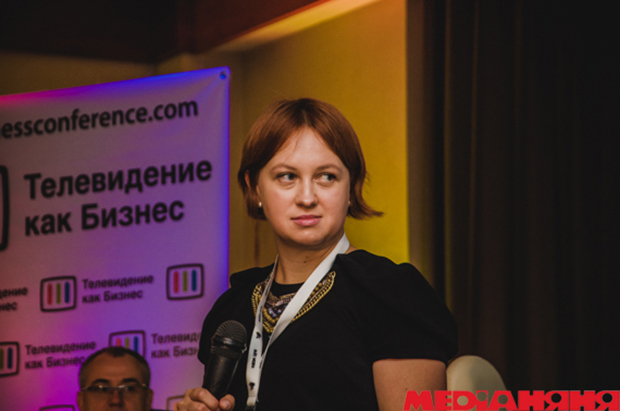
With the answer to the question “Who is to blame?” panelists sorted out quickly and unanimously – are to blame, in a bid to overtake competitors by buying content at double the price, driving praymovy product predpraym and expensive product – in the night air . With the answer to the question “What do I do?” Came more complicated: not considering the possibility to combine the efforts of broadcasters, talked about how to get advertisers to pay more. Oleg Pavlenko, for example, suggested that such a scheme:
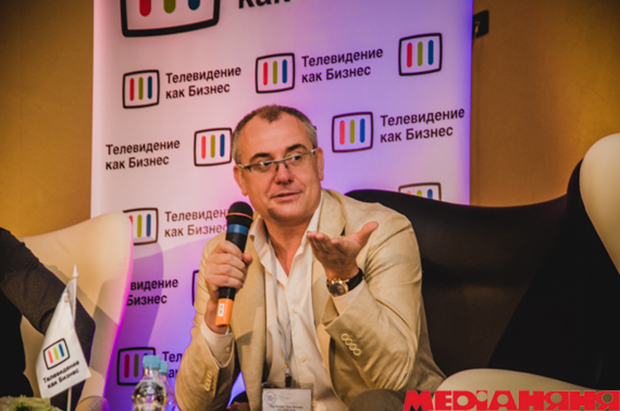
«We will be a point to work with each advertiser, trying to convey a simple message: if the client receives a profit, it would be nice to share with the media channels, which helps him in this. Because we are with them in the same boat – if they lose us, you lose and gain ».
Making sure that the TV people are still going to be put into the content more than the market allows, sitting in the audience advertisers have tried to turn the conversation to another level, asking how to deal with the “unfashionable” television in the eyes of advertisers seeking placed on a more “fashionable” Internet sites?
«If Internet platforms such fashion, why their representatives line up to buy our content?» – outraged Valery Varenitsa. And, thus draining topic has enabled myself and colleagues once again to talk about the program “Clean Sky”, which allows broadcasters to monetize content on the Internet.
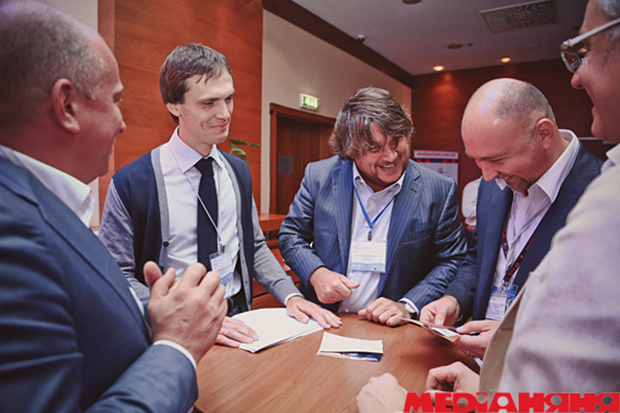
After the speech, the top managers for a long time did not disperse, considering the photos from last year’s conference
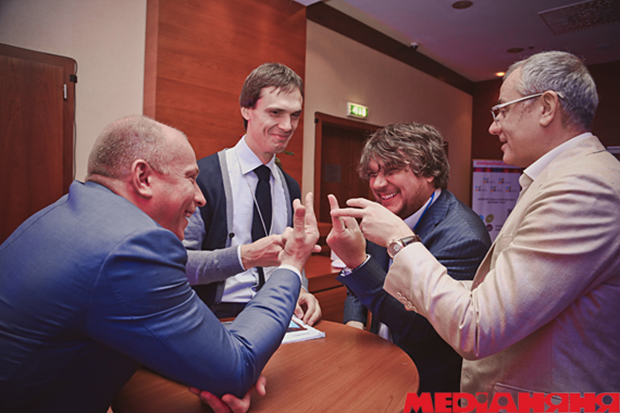
and playing rock-paper-scissors. Oh, Yegor, it seems, was stabbed
planning conference, the organizers tried to cover all aspects of the television business, the important part is – fresh blood. To learn how to work with media holdings new generation of media people, the audience was told by those who, in fact, takes on the task of the representatives of this same generation – HR-managers channels.
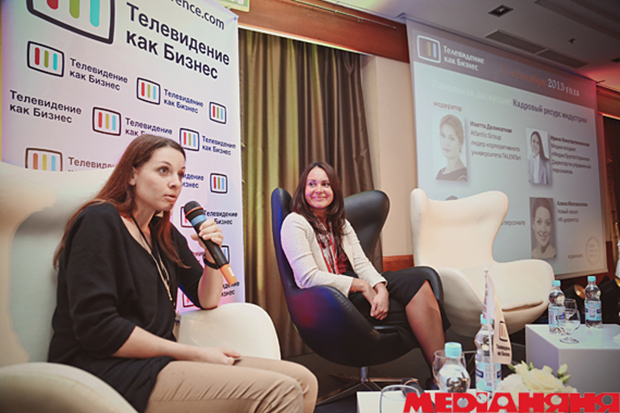
Irina Kostyantynivska of “Media Group Ukraine” (right) recognized that the problems with the staff there. But there is a problem with their preparations, as the higher education in the country does not meet the requirements of the industry, which is rapidly changing. Her colleague from the “New Channel” offered a practical solution: to develop a program of participation of the best students in seminars world-class industry gurus who visit the canal workers. Thus young people planning to work in television, will receive the necessary knowledge on favorable terms, and the channel – to invest in future employees. Particular attention should be paid to those who will go into production of entertainment content, as this in our universities, in contrast to the newsroom or documentary journalism, they do not teach at all.
discussion moderator Delicate Yvette (Atlantic Group) said that the Ministry of Education of Ukraine has recently proposed to professionals from the areas of marketing and communications prescribe what companies expect from young professionals to include this program in high schools.
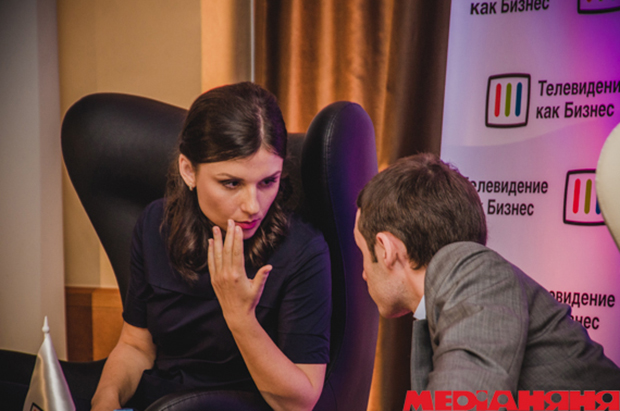
On Anna Barannik heard of “1 +1 media” reacted speech full of skepticism:
– We do not believe in the initiative of the ministry, as our officials do not really care about the students, they do not go to bed with the thought of how to improve education in the country. In addition, the TV business is changing so fast that the program, which will invest a lot of effort, a couple of years may not be relevant. And again, here talking about “Interpipe”, working directly with universities – we are such a solution is not appropriate, as our business less profitable. And these investments for the future is very difficult to calculate.
While education in the country is, the industry is growing, requiring more and more media people of knowledge and skills. They should be in modern executives, said Roman Tyshkovsky of the company Orders Berndtson, has been recruiting top executives of advertising and media industry in Russia. Information, as for me, curious, so try to explain it tezisno.
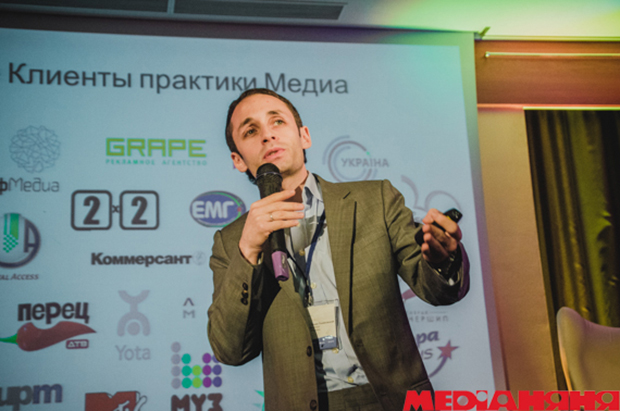
Speaking of trends, the main are: younger executives (if in 2008 the average age of the leaders of Russian channels was 45 years, in 2012 it dropped to 35, and continues to fall), the rise and the fall of the leaders have become increasingly unpredictable, the number of cross-transitions (for example, the scope of the CG on TV) increases and the markets of Russia and Ukraine in terms of career become one (for example, the Russians Igor Zolotarevskiy, Vladimir Lokotko and Yegor Nekrushev work for us and Ukrainians Rodnjansky Alexander, Daria violet and Victoria Shulzhenko – the neighbors).
Quick career leaders does not mean that they are subject to fewer requirements. Well, now require the following: not general knowledge and deep – at least in one segment, the availability of professional education (Ukrainian or Russian is not quoted), the ability to work with new technologies, such as BigData, and the ability to think of business categories. Thus, managers should invest in their education, as it may already be recouped in 2-3 years.
In addition, the modern reality television executives valued the ability to engage the viewer in the process (the audience does not want to just watch – she wants to participate). According to Roman, in our territories that have not yet learned, so you should pay attention to the Western experience. For example, Amazon, intending to produce their own content posted to the Internet 14 pilots, inviting viewers to choose what they want to watch. Projects that won the vote, immediately went on proiszvodstvo.
– I often hear that the TV is going to die and will not need telemenedzhery, – summed Tyshkovsky. – Nonsense! Soon all will shoot their own content – “Google”, “Yandex”, “VKontakte”, so people who can lead the media business will be always in demand.
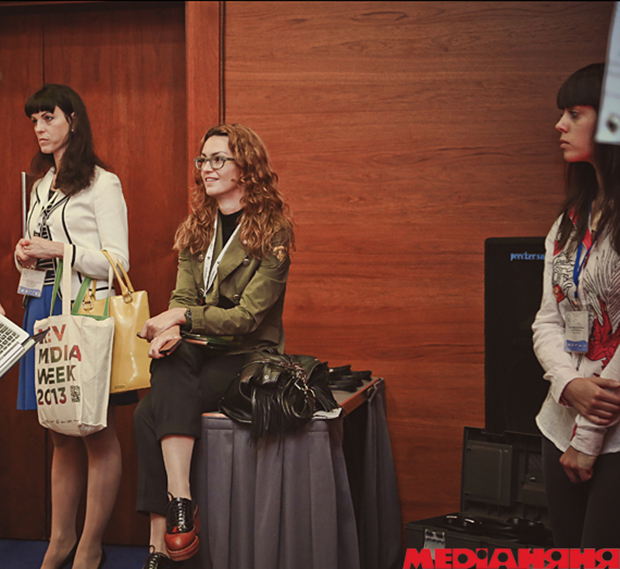
Iryna Kostyuk Rapporteur listened with a smile
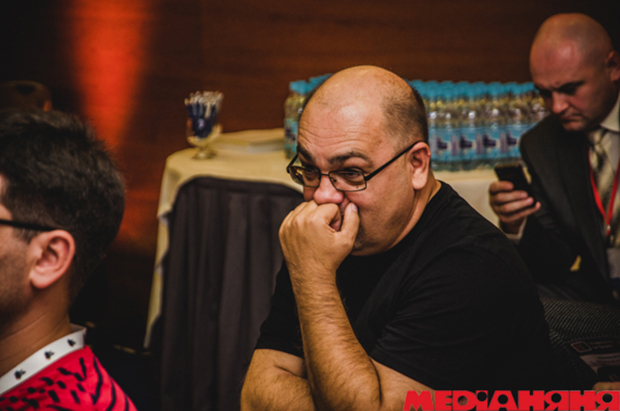
Robert Opalenik hard thinking
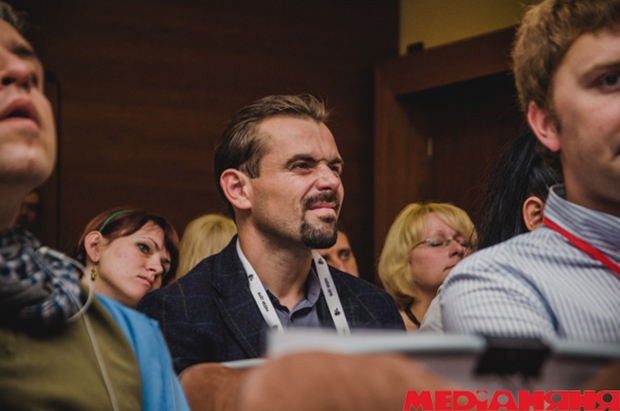
And someone said, it seems, did not believe

During a break at a coffee fed sweet – say, perfectly activates brain activity
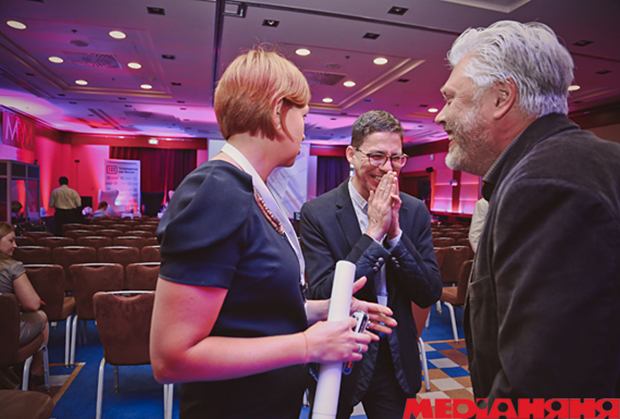
Kateryna Kotenko found time for everyone, coming towards her with ideas for the conference, as well as on a large-scale communications campaign that ITC will soon
Another panel discussion, interested me was called “The future of television news.” The theme chosen not by chance, because the news on TV to compete with the information on the Internet, to which many people are not involved in the production of most of these news are also skeptical. On the situation editor-in-chief TSN Tatiana Pushnova, moderated the discussion, looking more broadly, need not compete with the Internet and try to understand what is expected of TV news people who receive information from the network (eg, in positive territory, according to studies, about 50%).
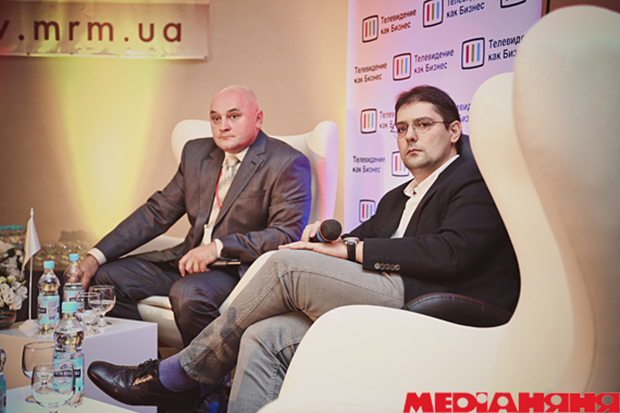
In turn, Igor Zolotarevskiy shared the results of research channel “Ukraine”. It turns out that most of the audience still thinks television in the most expeditious means of information delivery:
– We have long thought, why, and then realized: a man turns to the media that he was comfortable in a given period of time. In the morning, in the most convenient, going to work, listen to the murmur of the TV, and so he gets the first batch of news per day (in order to read them online, you need to turn on the computer, open a website and immerse yourself in the process). This model of information consumption inherent in our nature, so the demand for TV news will not be lost even with the arrival of a new, younger audience.
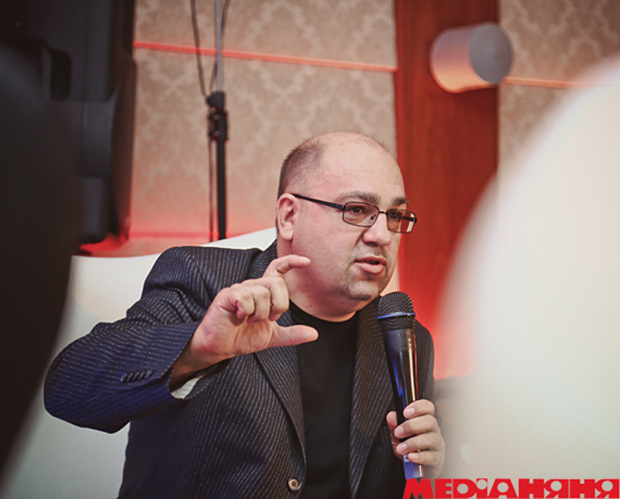
No comments:
Post a Comment